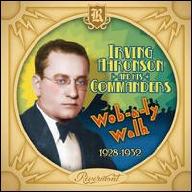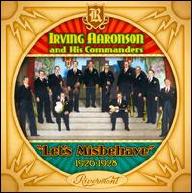Aaronson's Commanders had a bright, peppy, swinging sound that quickly made them a favorite in the era of college humor and bootleg gin. Aaronson's Commanders were a highly popular outfit on the movie theater and ballroom circuit, as their splashy, big-boned arrangements and onstage antics were ideally well-suited for these types of venues. In terms of their recorded work, the Commanders relied heavily on novelty numbers that featured their wild and loony frontman Phil Saxe. The band was filled with talented instrumentalists -- for example, saxophonists Artie Shaw and Tony Pastor -- who met while playing in this band. The arrangements were tough, complicated affairs drawn up mainly by the band's pianist Chummy Macgregor, who later developed the famous ride-out chorus that concludes Glenn Miller's In the Mood. Among their notable Victor recordings were Poor Papa, She Was Just a Sailor's Sweetheart, I'm Just Wild About Animal Crackers, I'll Get By as Long as I Have You, Wimmen-Ah!, and Waffles, to name a few.
In 1928, Aaronson's Commanders scored a hit on Broadway appearing in Cole Porter's show +Paris, backing up French chanteuse Irene Bordoni. Among the Porter songs introduced in +Paris were such certifiable classics as Let's Misbehave, Let's Do It, and Don't Look at Me That Way, The Land of Going-to-Be, and Two Little Babes in the Wood. The Commanders made the first recordings of all these songs, some with Bordoni and some without. Both Let's Misbehave and Let's Do It became best-selling records that regularly appear on compilations of vintage 1920s dance band music. However, Two Little Babes in the Wood was never issued and no copy has ever been found. With the advent of +Paris being adapted into a Vitaphone movie musical by Warner Bros., the Aaronson band headed for Hollywood. But outside of Bordoni, nothing of the stage version of +Paris was retained for the film, which opened on Black Tuesday in 1929 and was a resounding flop. The Commanders had to settle for making an MGM musical short in November 1928, and as in the case of #Paris, nothing remains of this film save the soundtrack.
Aaronson's Victor recordings stop abruptly in January 1929 after just 27 titles, a total way under the average for such a popular group. 18 months were to pass before the band recorded again for Brunswick, two sides released in the depths of the depression, so obscure that extant copies of the record are unknown. This was a few months before the first edition of Aaronson's Commanders collapsed due to the economic fallout opening up around them. By 1933, Saxe and Aaronson had put together a new incarnation of the Commanders, including drummer Gene Krupa, future bandleader Bob Chester, and vocalists Harmon Nelson and Kay Weber. The band played to packed houses at the boardwalk in Atlantic City and were especially popular at the Avalon Ballroom on Santa Catalina Island, where they played a long home stand that included live broadcast radio remotes. Recording again for ARC, the Commanders produced about 20 sides that appeared on Vocalion and "Royal Blue" Columbias. Aaronson's Commanders backed up Bing Crosby on his final ARC session, which included the hit Love in Bloom. The second edition of Aaronson's Commanders was one of the finest of the early swing bands, but had a difficult time making it in the hard economic climate of the depression. Aaronson must have known that the end was coming, as the very last of their "Royal Blue" Columbias, made in January 1935, was Commanderism, the band's theme. Aaronson finally threw in the towel about a year later.
After spending a couple of years more or less without work, Aaronson landed a job working in Josef Pasternak's unit at MGM working as an assistant musical director. Due to the nature of the way movie credits were doled out to such underlings, little is known about what Aaronson actually did in his two decades at MGM. But by 1950 he was working very closely with singing star Mario Lanza, converting familiar, public domain melodies into copyrightable English language songs that were designed to sound good for Lanza. One such number, The Loveliest Night of the Year, was so adored by Lanza that he was furious to learn that Josef Pasternak had decided to give the song to Lanza's co-star Ann Blyth in the movie #The Great Caruso. Lanza was able to finally sing the number himself in his failed "comeback" picture #The Seven Hills of Rome, filmed mere months before his premature death at age 37 in 1959.
Irving Aaronson retired on the MGM plan at age 65 in 1960, but succumbed to a heart attack only three years later. By that time both he and his Commanders had been forgotten and were held in low regard by jazz aficionados, save a few who regarded the Commanders' Victors as a sort of guilty pleasure. Nonetheless, many future leaders of swing bands went through the ranks of the Commanders, and all remembered Aaronson as a fatherly and endlessly patient leader who set an excellent example of professionalism and showmanship. Of these leaders, only Artie Shaw has been critical of the Commanders' novelty aspect and deliberate silliness. In the year 2001 the relatively few 78 rpm records of Aaronson's Commanders have enjoyed a renewed popularity among collectors, though no retrospective package on CD had surfaced by 2001. Suffice it is to say that the Cole Porter songs Aaronson's Commanders recorded in the late '20s have a definitive aspect that makes them appealing, and other records are enhanced by fine occasional solos, tight ensemble passages, and the wonderfully zany quality of Phil Saxe's vocal performances. ~ Uncle Dave Lewis, Rovi













